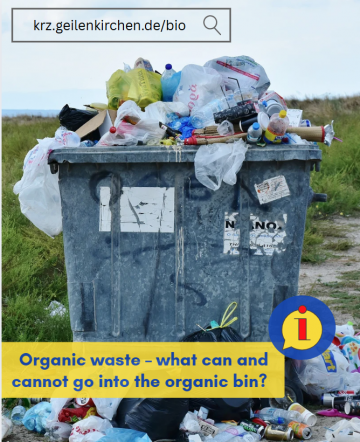Welcome

Welcome to the newly designed homepage of the city of Geilenkirchen.
As mayor, I am pleased that you would like to get to know the city of Geilenkirchen in this way.
The homepage provides you with extensive information in many areas. Our services can be found below in the service portal.
During the redesign of the homepage, special attention was paid to a barrier-free design. In this way, the contents of the site should also be accessible to people with disabilities.
For your request, I can be reached by e-mail to armin.leon@geilenkirchen.de or arrange a (telephone) appointment with my anteroom (02451/629104).
Kind regards from the town hall
Yours
Dr. Armin Leon
Mayor
Organic waste – what can and cannot go into the organic bin?

- Important changes starting May 1, 2025
- Increased inspections by the waste management service
- Incorrectly filled bins will not be emptied
What can and cannot go into the organic bin?
This is a question that all households will have to ask themselves starting May 1, 2025, as the amendment to the organic waste regulation (BioAbfV) comes into effect. The goal of these new regulations is to further strengthen the circular economy, as well as improve the quality of organic waste.
To improve quality, the amendment includes the following key points, which must be implemented, monitored, and enforced:
- Maximum contaminant limits: The maximum allowable percentage of plastics (including biodegradable plastics) in organic waste will be further reduced to 1% for plastics and 3% for foreign materials.
- Ban on certain materials: Packaging made from bioplastics and other materials that are not sufficiently degradable can no longer be disposed of in the organic bin.
- Improvement of sorting purity: Municipal waste collectors must take measures to reduce contamination, e.g., through increased inspections and public awareness campaigns.
For organic waste and compost quality, the following materials are particularly problematic, as they do not fully decompose or take too long to break down in the composting facility:
- Plastic bags and bioplastics
- Coated packaging (e.g., bakery bags)
- Coffee capsules (even the "recyclable" ones)
To effectively implement the new regulations and improve organic waste quality, the local authorities will immediately launch information campaigns. All households will receive a well-designed flyer in the coming weeks, which will serve as a checklist for properly filling the organic bin. Citizens will also be encouraged to properly sort organic waste through social media posts and will learn about alternatives to bio and plastic waste bags.
The authorities are in close communication with the waste management service, which will intensify inspections of the contents of the organic bins. There will be continuous feedback to the authorities, who will impose sanctions if necessary. Possible sanctions include:
- Non-emptying of the organic bin, resulting in self-sorting or disposal as residual waste
- Complete removal of the organic bin
- Imposition of a fine
These measures are intended to help implement the new legal requirements and, in the long term, improve the quality of organic waste in Geilenkirchen. The main goal is to keep waste disposal fees stable. If the organic waste in the city of Geilenkirchen becomes too contaminated, it may have to be disposed of as residual waste, which not only incurs higher disposal costs but also significant additional transport costs to a different landfill. To the benefit of all taxpayers, it is therefore important to adhere to the new regulations.
What can and cannot go into the organic bin?
In general, the organic bin should contain all biologically degradable waste of plant origin. Biodegradable waste of animal origin is excluded.
No ✓
- Plastics
- Collection bags made of biodegradable plastics
- Compostable packaging (bio waste bags)
- Meat and fish scraps, bones, and fishbones
- Ash (from fireplaces, cigarettes)
- Small animal litter
- Coffee capsules
- Vacuum cleaner bags
- Street dirt
- Plastic bags
- Dog and cat feces
Yes ✓
- Tree, shrub, and grass clippings
- Flowers and plants (without pots)
- Leaves
- Fruit and vegetable scraps
- Raw food scraps (plant origin)
- Tea bags, coffee grounds, filter papers
- Wild herbs
- Newspaper for wrapping organic waste
Important: This list is not exhaustive!
